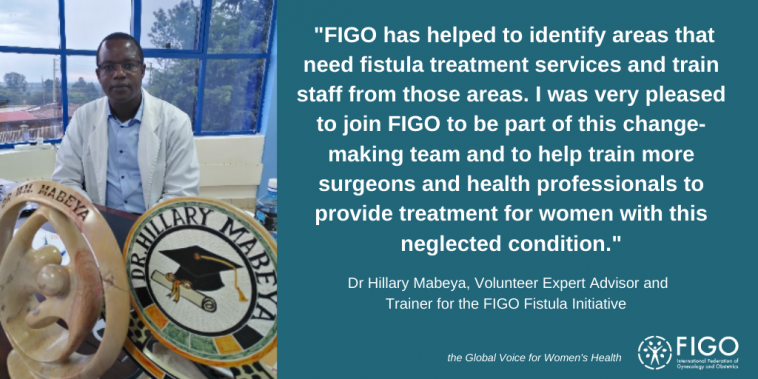International Volunteer Day - Thanking our Volunteers

For this year’s International Volunteer Day on the 5th December, the campaign will thank volunteers worldwide and shed light on the difficulties and needs of volunteers during the pandemic. Together we can highlight the impact of volunteers in their communities during this crisis. We will reach to all corners of the globe with the message: Together We Can Through Volunteering.
FIGO is fortunate enough to work with volunteers across all aspects of our organisation, from the staff working on our projects in their respective countries, to the Trustees who dedicate their time to helping us achieve our vision of all women globally having access to and receiving quality health care. One such example are Female Community Health Volunteers, who we partnered with to carry out and deliver the PPIUD project. They organise regular mothers group meetings across their community, and provide comprehensive counselling.
We also have a team of Fistula Fellows and Trainers as part of our Fistula Surgery Training Initiative. We interviewed Dr Hillary Mabeya, Volunteer Expert Advisor and Trainer for the initiative, and the Director of Gynocare Women's and Fistula Hospital in Kenya, to find out more about FIGO volunteering.
These are just two examples across so many more. We extend our utmost thanks and gratitude to all volunteers who have worked tirelessly despite the challenges 2020 has brought.
We are delighted that you are part of the FIGO Training Initiative as both a Trainer and a volunteer on our Expert Advisory Group, can you tell us about your work with FIGO and why you decided to become involved in the initiative?
The FIGO Training Initiative has provided a forum to train more doctors and health teams in fistula care, with the goal of greatly increasing the number of skilled surgeons and nurses. FIGO has helped to identify areas that need fistula treatment services and train staff from those areas. I was very pleased to join FIGO to be part of this change-making team and to help train more surgeons and health professionals to provide treatment for women with this neglected condition.
How has the current global COVID-19 pandemic affected your work this year and what do you think will be the effects over the longer term?
The unprecedented COVID-19 pandemic will definitely increase cases of obstetric fistula, due to greater delays in women getting to hospital, deepening poverty and a subsequent rise in home deliveries. Fear of the virus has stopped some mothers going to hospital, so more women are having home births, which increases the risk of poor maternal and newborn outcomes, including obstetric fistula, and even maternal death. This situation is worsened by curfews and lockdowns, as families are afraid to use public transport or they fear getting caught outside at the wrong time.
Although some fistula patients are still coming for surgery, fewer have been coming in recent months, as they are no longer travelling from other locked down areas. We anticipated that fistula repairs would decline during this period, but do expect overall numbers of women with obstetric fistula to increase because of the many new cases arising from the pandemic.
The number of women delivering in Gynocare has also increased because the other maternity hospital in Eldoret has been made into a COVID isolation centre. Hence, there is a greater need to protect our patients and medical personnel, but the costs of hospital consumables have doubled or even tripled.
In the last few months, a serious second wave of the pandemic has hit Kenya. COVID numbers have increased tremendously and many colleagues have died and are dying every day as cases have continued to rise. We have some tough months ahead, but with the help of our partners, including FIGO, we hope our team will stay safe and that number of COVID cases will reduce by January so we can continue our important work.